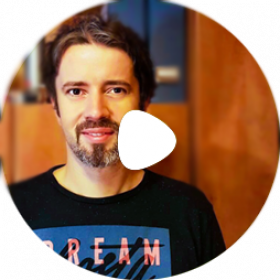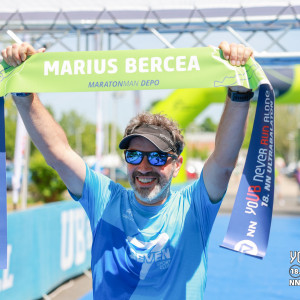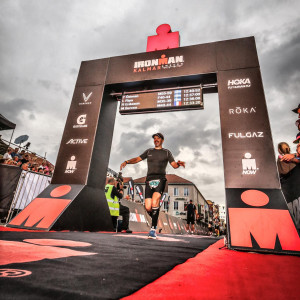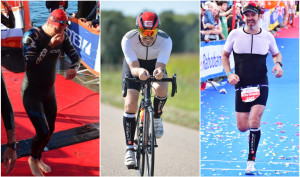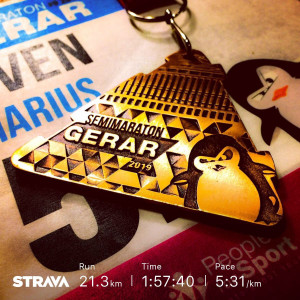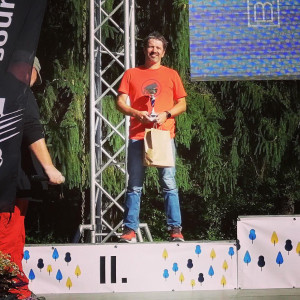Marius Bercea
Personal blog
The Story
Ultrabalaton 2024 - 211 km, 30 hours and 15 minutes
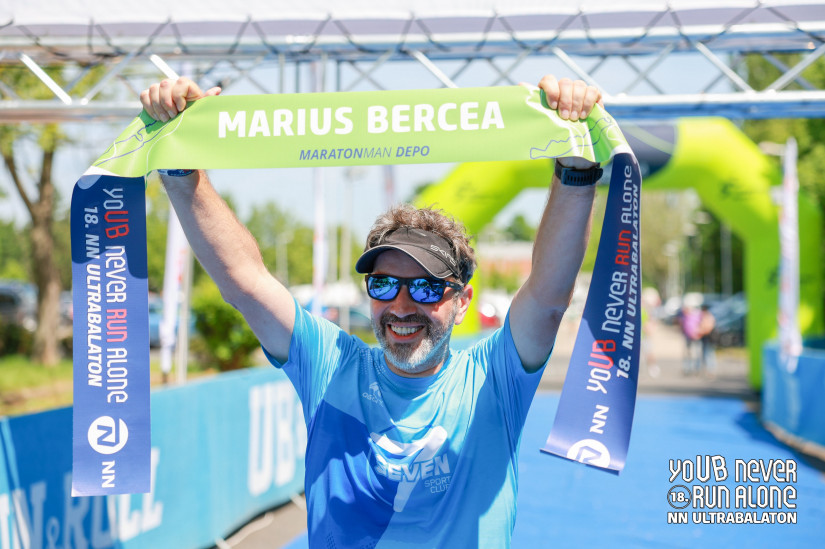
It was the toughest and most challenging race I've ever faced. This was my ultimate test, marking ten years since I changed my lifestyle, lost weight, and took up running. This race utilized every bit of knowledge and skill I’ve accumulated over the years about running. Everything was useful—from techniques and nutrition to strategy and the friendships and community I've built around me. This achievement truly crowns all the mental and physical efforts I've invested over the past decade.
Given the event’s early start at 7 AM on Friday, I chose to leave on Tuesday evening to Sibiu and then continue on Wednesday to Balatonfüred, or Tihany as it was this year, where we were staying. I always make sure to have two nights before the race. The journey to Sibiu was tough with heavy traffic leaving Bucharest and on the highway. We arrived at our accommodation around 11:45 PM and went straight to bed. I didn't sleep well or for long, my mind preoccupied with the race, strategy, nutrition, and more. I woke up around 5:30 AM and tried to sleep again, but to no avail. At 7 AM, I went for a walk downtown. Although I wanted to run, it was too chilly, so I opted for a coffee from 5togo and sat on a bench in the Big Square, soaking up the sun.
At 9 AM, refreshed and caffeinated, we hit the road again. We didn’t rush, made some stops along the way, and reached our destination around 5 PM. Tihany is a picturesque village on a peninsula stretching into the tranquil waters of Lake Balaton, known for its spectacular landscapes and rich cultural heritage. Its narrow streets and traditional houses offer a unique charm, attracting visitors seeking authenticity and natural beauty. Besides, the village is also famous for its lavender fields, which add a colorful and fragrant note to the scenery during the blooming season, attracting nature and photography enthusiasts. In the heart of the village stands the venerable Tihany Abbey, a historic monument with impressive architecture, offering panoramic views of the entire lake. This place is ideal for those who want to combine relaxation with discovering historical and natural treasures in an exceptional natural setting.
We quickly settled in and explored the locality. Although we hadn't planned to eat out, Carmen noticed a red pot on a table at one of the terraces. We knew it was goulash, but it looked so appetizing that we instantly got hungry. Without dragging it out and making you hungry too, I’ll just say it was a fantastic carbo-loading session. The goulash was delicious and more than enough for two, accompanied by fresh, good bread. We also ordered some pasta, but they paled in comparison to the first course. We tried a local lavender beer, which was so interesting that we brought back about 10 bottles home.
The next day, I woke up early. Our accommodation was by the lake, and I enjoyed a coffee on the terrace, admiring the sunrise and the vast lake. “Csak egy kör,” as the race organizers say, meaning "Just one lap"—that’s all I had to run.
The day passed quickly. I had a nice run along the lake to Tihany's port. We took several photos and enjoyed the good weather. The forecast for the next day was uncertain, with rain predicted. At 2 PM, I went to pick up my race kit. We wandered around the expo, and I bought yet another number belt. I always forget these at home and now have a collection, enough to start a museum someday.
At 5 PM, my childhood friend and cyclist, Attila, arrived—the second member of our team. Carmen was to accompany me by car, and Attila by bike. Together, we prepped everything, ensuring they knew the strategy, what I would eat and drink, and when and why. Despite most things being ready, it took us a while, but it’s not like I could sleep any earlier. Amid preparations, we returned to the same terrace for more goulash and lavender beer. The weather seemed perfect, and I was convinced Accu Weather was wrong about the forecast. We went to bed around midnight, and I fell asleep quickly. I set my alarm for 5 AM, but I was up by 4:30 AM, already restless. The first thing I did was check the weather from the terrace—it was beautifully raining. This fine rain penetrated to the bone, but at least I knew how to dress for the start.
I did a couple of massage sessions with a pressotherapy device I carry for such occasions—a great investment from a few years ago. These devices, also known as compression or lymphatic drainage devices, are extremely beneficial for runners, helping warm up and prepare muscles for effort, reducing injury risk, and improving flexibility. During long races, pressotherapy can provide temporary muscle relaxation, maintain optimal circulation, and prevent cramps and fatigue. After the event, it speeds up recovery by enhancing blood flow, aiding quicker and more efficient muscle regeneration. My plan was to use this device even during the race, right in the car, using a 220V car adapter.
After the massage, I had a couple of croissants, drank a coffee, visited the restroom several times, and at 6:15 AM, we left for the start area. The journey took about 15 minutes. The start area was well-organized, with ample parking in a supermarket lot, and volunteers guided us efficiently. I helped Attila set up his bike and do final checks. We took a group photo and headed to the start zone.
There, I met Cornel, a great runner I’ve known for several years, with whom I’ve run a few times. He has many ultras under his belt. At the start, I also met Bogdan, a runner from Carei I’d talked to on Facebook. He was participating in a wheelchair and was no stranger to ultra-experiences. A cheerful guy, eager to start. I also met another runner from Romania, but I forgot his name due to the pre-race jitters.
A few minutes before the start, I tried loading the course map on my watch. Both Cornel and I had trouble getting the map to load. I tried resetting my watch, but eventually, the course appeared, and I started it a couple of minutes early to ensure it worked. The map is crucial for such distances because, despite the organizers’ efforts to mark the route, intersections can still be missed, especially when combined with fatigue.
3, 2, 1… START! Finally! I’d been waiting for this moment for months, and it had finally arrived. The weather wasn’t cold, but it was drizzling lightly. After about 3-4 km, I ditched my rain jacket as it wasn’t cold and I was starting to sweat underneath it, making it useless. Cornel and I ran together, chatting and joking, enjoying the scenery. Despite having made 100 plans and strategies, due to the uncertain weather, I decided to let my body run naturally, as I’d trained it in recent long runs. I didn’t want to hold back but also didn’t want to push too hard, aiming to reach the halfway point at Fonyód, km 106, as quickly as possible.
I started at a pace of 6:30 min/km, gradually decreasing to an average of 6:10 min/km. Cornel and I ran together until about km 12, then each went our way. I made full use of Attila, my cyclist. He knew the nutrition plan and reminded me every half hour to take my gel, and every hour to take my salt pills. He kept track of my fluid intake to ensure I was drinking enough. Given the humidity, I drank more than planned, which was fine as it prevented dehydration. When supplies ran low, he met with Carmen to refill flasks, gels, and other necessities. They prepared spare clothes if needed. This allowed me to skip the aid stations in the first part of the race.
Around km 20, we met Andra, another runner from Romania. She heard us speaking Romanian and greeted us. Unfortunately, we didn’t chat much as we were running at a faster pace at that moment. We wished each other luck and went our separate ways.
The kilometers passed quickly, and I reached km 39 rapidly. After a short stop at a railway crossing, I arrived at the first significant checkpoint, Varga Pincészet, a renowned winery in Hungary known for producing quality white wines. The organizers planned the route to include a quick visit to this winery, allowing us to experience the unique atmosphere where wine aromas blend with the ancestral aura of wood, creating a distinctive profile found in traditional cellars. The winery visit served as a good chance to stretch, with a slight uphill to the entrance and about 50 steps down into the cellar and out. This led to groans and laughs in equal measure.
This experience reminded me of the cellars I recently visited in Italy, especially the Giuseppe Quintarelli cellar, a fantastic experience that left me on multiple paths. While reminiscing about that and running among vineyards under the scorching sun, another 10 km flew by, and I found myself at the km 50 checkpoint, where I had planned my first stop.
Everything was ready here: the pressotherapy boots set up and ready. I sat in the car, put on the boots, and just had to press a button to start the process. I was served with pogácsa (Hungarian scones) and cold cola. I was living it up! I say "this time" because last year Gheorghe, who was in charge of the car, was a mess. A good friend for 25 years, he’s great for moving furniture or legal advice, but after two attempts at Ultrabalaton, I realized he wasn’t cut out for this. He even managed to hit me with a bike in the first year.
While I relaxed and refueled, Carmen and Attila refilled flasks and gels, fetching whatever else I needed. The bad weather had passed an hour earlier, and it was now very hot. I spent about 15 minutes here, changed my shirt, and set off again.
The course had been partially changed from previous years, leading us through a small forest, providing some shade from the sun. Then we hit a long, straight stretch beside a kind of delta. Fortunately, the sky had clouded over a bit, sparing us from the sun’s intensity. This relief was short-lived as it began to drizzle at km 57. Attila got caught up at a railway crossing, falling behind. As the raindrops grew larger, I began to worry, but then I saw Carmen on the other side of the road at a gas station, taking pictures and cheering me on. This unexpected encounter was a tremendous morale boost, giving me strength to face the worsening weather.
The rain intensified into a downpour, but I kept running. Not long after, I heard honking and cheers from the road. It was a group from Sfantu Gheorghe who had been cheering me on throughout the race and were participating in the relay event. This time, Gabriella, Ildikó, and Fodor stopped ahead to cheer me on. Gabriella's hug moved me to tears, but it filled me with even more energy and confidence.
Attila caught up with me, but it was too late to grab the raincoat. Honestly, it wouldn't have mattered with the amount of water pouring from the sky. The two unexpected encounters had given me such a boost that I didn't care about the weather. I was running very well, my pace dropping below 6 min/km, using all the water and coolness to my advantage. My feet got soaked in the first few minutes, so I didn't bother avoiding the endless puddles that had formed on the course. I saw other runners hopping like deer to avoid them, but it seemed pointless and a waste of energy to me.
At km 60, I encountered a spectacle. A group of "drummers" created an incredible noise. I heard those tribal rhythms at least 500 meters before reaching them. I filmed them, fascinated, almost missing the chip scan. I passed the lady with the sensor who had stepped out in the rain, almost invisible. Attila had to shout after me to wake me up and turn back.
The rain stopped after about 30-40 minutes, and the sun didn’t come out decisively. My clothes started to dry slowly. I eagerly anticipated reaching km 72, where there was a cooked food aid station. I was curious about the offerings, especially as I began craving solid food.
At km 70, something got into my eye, causing intense pain. After struggling with Attila to remove it, I thought I succeeded, but the discomfort persisted while running. I called Carmen to notify her that we were close, and she gave me a fantastic surprise: she had bought French fries from a nearby McDonald's. At that moment, I forgot about the eye pain and fatigue, focusing solely on getting there as quickly as possible.
Friends, you can't imagine how good those fries can be during an ultra marathon. The joy such a small thing can bring is incredible. They were accompanied by a cold cola and a bag of Haribo candies in pill shapes, a newer product. I slowed down to eat while walking with Carmen. She knew about my experience in Malta when I didn't stop to buy fries and craved them badly. These were the best fries on Earth. The walk together was beneficial for morale and my eye. She checked and found another piece of whatever had entered my eye, which had caused the pain.
From this point, I started checking my phone more often, reading messages on WhatsApp and a support group I had created. They helped a lot. After this feast, I started singing out of joy and sent a song to the group. Oana replied with another song, and we had a blast.
At km 80, I concluded that my clothes wouldn’t dry and changed my shirt. I felt great, running steadily at a 6-6:15 min/km pace. I began chatting more with Attila, reminiscing about those places, and recalling how it was a year or two ago. Talking about memories, time passed quickly.
When I passed the spot where I abandoned two years ago, at km 100, I had 10 hours and 30 minutes on the clock, which was fantastic. By fantastic, I mean the shape I was in and that we were nearing the halfway point. Time wasn’t a goal in this race, but I wanted to reach the halfway point, km 106, as soon as possible because that’s where the real adventure and challenge for me began—the tough part, the night, the fatigue.
We quickly passed through the halfway checkpoint, planning to stop at km 107, where we booked a room for the night specifically for this break. Carmen had gone ahead to prepare everything. When we arrived, we took a photo and went upstairs. Yes, you read that right, the room was upstairs, but the climb (up the stairs) wasn’t too bad. I changed all my clothes, including socks and running shoes, and lay down for a massage for about an hour. I ate and drank everything I desired, posted on Facebook, and started reading the encouraging messages coming from all possible directions.
Feeling too warm, I asked Carmen to open the window wide, which turned out to be a bad idea. When I got up, I had chills, which took a while to shake off, despite putting on warmer clothes. Meanwhile, we packed the bike bag for the second half, ensuring everything needed was at hand in the car. This break lasted about an hour and 38 minutes but was very well spent.
Even though it was tough to get moving after such a long break, and the first steps felt like running with someone else's legs, after 200 meters, things returned to normal. After a few kilometers, I was running almost like before. I left in a long-sleeved light shirt, shorts, and a windbreaker, but after a few kilometers, I got warm and took it off. Interestingly, I took it off right after a checkpoint where Attila had stopped to grab various items. When he started again, due to many relay runners in the area, it was hard for him to find me, especially since he was looking for a runner in a green jacket, while I was in black.
While I ran without my guardian angel, who was searching for me, Csabi approached me, saying he knew me from Facebook and his sister. I was surprised to learn he was Gabriella's brother, the one who, along with Ildikó and Fodor, had cheered me on in the rain. Csabi was part of a relay team, running 50 km. I don't remember his exact kilometer, but he wanted to slow down and took the opportunity to accompany me. He had a cyclist with him, Lóránt, who was also at km 110 like Attila and me.
Attila appeared, looking for a green runner, not the black-clad one with another runner and cyclist. So we chatted away, the runners among ourselves and the cyclists among themselves, for about 10 km. By then, it was getting dark, and we all turned on our headlamps. At km 122, something funny happened, straight out of a comedy sketch or a TikTok moment for the younger folks. Just before an aid station, where it was crowded with parked cars, Lóránt, deeply focused on checking the route on his phone to inform Csabi of the relay change point, rode into a parked car. We watched, wondering what he was doing, but before we could shout, he was already sprawled on the car’s hood. He wasn't going fast, so there was no danger of injury, but we all burst out laughing when we saw the driver's perplexed face. The driver, poor guy, was shocked, staring wide-eyed at Lóránt.
We continued our run, and after a few minutes, Lóránt caught up, explaining how the driver didn't want to get out of the car and asked if he had damaged it. Lóránt assured him he hadn’t and went on his way. The driver was probably a runner who had finished a relay leg, and getting out of the car wasn't appealing, not even for the car's sake.
At km 122, I informed Csabi I was taking a walking break, said goodbye, and off he went. My issue was different, and I didn't want to ruin his pace. I then took a regal break by the roadside to leave a "drop of appreciation" in nature. After this light relief, I resumed running, feeling lighter by at least a kilo.
Then came km 127, the spot where I abandoned last year. For a year, I was sure it was km 125. I called Carmen, telling her I felt a bit tired and to prepare the massage device at km 131, even though the original plan was to use it at km 148.
At the km 131 checkpoint, I arrived in the dark. I had a significant problem: my plan included a magnesium pill after each marathon. I had two with me for km 42 and 84, but now I couldn't find the rest. I was sure I had packed them in a specific place, but they weren't there. It turned out I had left them at home. Aid stations had magnesium vials, but I had an issue with liquid magnesium and couldn’t take it. Oh well, we'd manage somehow.
I got into the car, put on the massage boots waiting for me, and enjoyed some food. Coincidentally, our car was parked next to another from Sfantu Gheorghe. Here, I met Elemér and other Fitness Tribe athletes participating in relays. I knew most of them, and we joked around. Árpi showed up at some point, doing the relay leg with 7 extra kilometers, having missed the start area. I guess he got such a taste for it that no distance is enough anymore. I received tons of encouragement, and as the cherry on top, Tihamér, the runner-priest with whom I ran last year, called. I asked him to put in a good word for me up there; I was sure it would reach faster from him.
Unfortunately, at some point, I got chills and had to say goodbye to the guys and close the door. I assessed the situation and didn't hesitate. I moved to the heavy artillery, asking Carmen for winter clothes. I left bundled up as if for -20 degrees but without shivering. To understand, I wore a winter jacket with the hood up, winter running pants, and gloves. I took off again. My legs felt super okay, and within three minutes, I started shedding clothes.
Night and fatigue began wrapping their tentacles around me, and things became increasingly difficult. I started being unable to eat or drink. I felt quite nauseous. I took a Metoclopramid (thanks, Mariana, for the advice) and recovered for a while. At km 141, the checkpoint was on the lake's shore, on a long, endless alley where the wind blew fiercely. A cold wind that penetrated to the bone. I found Carmen here, bundled up with two jackets, two pairs of pants, a blanket, and more, but she was still frozen. We hadn’t synchronized properly, and she had waited in that bone-chilling wind for 15-20 minutes.
We didn't stay long here. A few encouraging words, a hug, and I moved on. She saw I wasn't doing well but couldn't do more. I continued along that endless alley by the lake, with the wind howling, until we turned into a small town where we were sheltered from the wind. The worst part was it wasn’t cold at all, and once out of the wind, I had to take off my windbreaker because it was too warm.
At km 145, I realized things were bad. The nausea had returned, and I couldn’t eat, despite trying everything. I was disgusted by the liquids I had. I realized I had no chance of continuing another 65 km without food and liquids; I’d run until I was completely exhausted. Then something banal but genius happened. I looked at my watch and saw it was almost 1 AM—the cursed hour I abandoned last year. How could I skip it? I remembered the madness in Malta when I stopped running after 43 km, returned to the hotel, slept for two hours, then went out with Carmen for another lap. What if I did the same now?
I discussed it with Attila and Carmen (on the phone) and decided to sleep for an hour at km 151, the next checkpoint. I had plenty of time, always ahead of the cut-off times. I struggled to reach km 151, which was actually km 148.5 on my watch. It was the only time I was glad the organizers' distances didn’t match my watch. I scanned my chip to show I arrived and went to the car.
Everything was ready for sleep. Carmen had made space for all three of us to fit and sleep somehow. They were also tired after so many hours. I put on the massage boots, Carmen handed me Pingu (a chubby penguin from Paul) and Marciu (a mutt I got from Satu Mare, meant to "eat worries" for kids), covered me with a thick blanket, and we slept. I told her to set the alarm for an hour and 45 minutes. I don’t know how much I slept. I remember turning on the massage device 3-4 times, but I think I got at least an hour. I woke up a few times due to leg pain but quickly fell back asleep.
The alarm rang like a dream. When I realized where I was and that the supreme test awaited, I opened the window to let in the air, checking if I’d get chills again. Nothing. I opened the door—nothing. I stuck one leg out, then the other—nothing. Then I got out completely. In shorts and a short-sleeved shirt, I hopped around a bit, waiting for the chills to hit again. Nothing. At that moment, I felt and knew I would finish this race! Attila told me the next day he watched in shock as I stood outside the car, barely dressed, not feeling cold while he was freezing despite being dressed.
I put on my windbreaker, took a gel, drank some water, and set off, telling Attila to catch up. I don’t even remember if it was hard to get moving, I was so happy and excited.
From here, things went well, though I had a memorable incident. After 3 km, I saw a train station on the right and thought I could visit the toilet. I had some very light sensations of needing to go and thought I’d take advantage of the station’s clean restroom. But as soon as my brain processed this, the sensation became uncontrollable—I almost soiled myself. I urgently asked Attila for wet wipes. The 10 seconds it took him to find them felt like an eternity. I rushed down the stairs, but halfway down, I had to stop, feeling I couldn’t hold it any longer. I had to cross under all the train lines to reach the station. I stood on the stairs for a few seconds, saying all the prayers I knew, then continued to the station. Coming out the other side, I couldn't find the restroom, even though the sensation was overwhelming. I asked a man where it was—30 meters away. I flew there, opening the door with one hand and undressing with the other. If anything had stood in my way, I would’ve definitely soiled myself.
I returned triumphantly to Attila, and things continued well considering the circumstances. I managed to take a gel every 30 minutes and drink water. The water tasted delicious, and I don’t know why, but it didn’t matter. The sky began to lighten, and at km 161, we arrived almost in daylight. Carmen was here, waiting and encouraging us. She kept telling me there was only a little left, which made me laugh because "a little" meant 50 km, or 25% of the total distance.
After another 2 km, the final challenge began—a seemingly endless climb. Starting with a 200m ascent at a 15% incline on the road, it continued on a bike path, so long it felt like we were heading straight to heaven. Attila kept telling me the hill would end after the next bend. I knew from last year, having run alone here, that this hill had no peak and never ended. Mentally prepared for it, I didn't mind. I walked a lot here, but whenever the incline decreased, I tried to simulate a small step run.
When the hill finally ended, there was another descent and ascent until km 171. The encouraging part was I could still run, albeit at 7-7:30 min/km. The only issues were the hills and the moments when my feet hurt. I’d then take short walking breaks. On these hills, I talked with Tihamér and read messages from you all. They did me a lot of good. I panicked a bit when I saw messages from Vali and Csilla saying I wasn’t appearing in the rankings, but I thought the best idea was not to care since there was nothing I could do and I risked demotivating myself.
At the km 173 checkpoint, I stopped because I felt a sharp pain in one of my right toes, fearing a blister. I checked, but there was nothing visible. To be safe, I wrapped that toe in special Urgo plaster and did the same with the adjacent toe. I continued, and the sensation disappeared.
At km 183, I faced a strong headwind. I had no idea where it came from, thinking I’d escaped it. Here, the volunteer group was in top form, cheering and encouraging us from at least 100 meters away. Carmen waited in the car, only stepping out when I arrived. I remember eating a lot of cheese with black olives. I stuffed myself. I poured my own water into the flask as Attila had other things to arrange. One of the ladies offered to help immediately, saying she liked serving handsome men like me. They had all sorts of encouraging lines to make you feel good.
I left there in high spirits, heading down a back street sheltered from the wind. After 500 meters, I noticed the Stryd sensor had run out of battery. The problem was my watch went into search mode, draining its battery faster. This had happened in the 100 km run in IOR two months ago. I called Carmen, asking her to come after us. I gave her the sensor to charge and arranged to get it at the next aid station.
I felt revived, free from the wind and under increasing heat. Attila and I chatted again, and I even asked if I was talking too much—the second time in this race. I was glad to chat again. He’s a dear childhood friend, from around 7 or 8 years old. We see each other about once a year, the last three years at Ultrabalaton.
I managed to maintain a 7-7:30 min/km pace, still taking gels every 30 minutes. I drank only water and cola, alternating with walking on the hills or when my feet hurt more, but never for too long.
At km 189, I got the recharged Stryd sensor. Here I discovered some delicious packaged pancakes. I think I ate four, leaving with two in hand. The heat increased, and the sun grew stronger. At the next checkpoint, km 192, with 19 km to go, I decided on a massage break. I had plenty of time, and it was a wise choice, as it revitalized me for at least another 10 km, reducing the pain.
I put on my headphones and focused on keeping a rhythm. When the heat became unbearable, I used water from my flask to splash myself. When it ran out, Attila was always ready with a fresh one. I drank a lot of water in the last part due to the intense heat.
The final aid station was at km 203. Here, I took a photo with the clock showing 200.8 km on my watch. I ate cheese and olives one last time and took off for the finish. More heat, another hill and valley on the bike path, until entering Balatonfüred with 3 km to go. I made a final stop to change my shirt and spruce up.
From here, we ran along a promenade full of tourists and locals creating a great atmosphere and cheering us on. Attila kept saying he got goosebumps, having never seen anything like it. As for me, my eyes were wet constantly, and I barely held back tears. Knowing I had 2 km left, emotions hit me hard. About 1 km from the finish, I had a bit of a cry, hidden behind my sunglasses.
200 meters from the finish was a final checkpoint to scan the chip, allowing the organizers to announce my name and prepare the personalized finish ribbon. When I crossed that blue carpet and the finish line, I felt a colossal weight lift off my shoulders. It had been my dream to finish this race, this 211 km monster...
My total time was 30 hours and 15 minutes (30:15:37), with 24:44:41 spent running and 5:01:06 in breaks. The average pace, including breaks, was 8:39 min/km, but the moving pace was 7:07 min/km. Besides finishing within the 31-hour time limit, I’m very happy to have run most of the time, even to the end, proving the training was correct and effective, and I nailed the nutrition, although it could’ve been better. I had no cramps or blisters. I don't have the official result yet but have emailed the organizers and await a resolution.
I want to thank my fantastic support team. Attila, who has accompanied me at Ultrabalaton for three years, stuck with me like glue, never leaving me to stray, not even to rest, for 30 hours. Carmen, who supported me continuously for 30 hours, was always where needed, preparing anything necessary. For the 5 months, she supported me during the preparation for this race.
I also want to thank all the runners from Sfantu Gheorghe and Fitness Tribe, who cheered me on countless times throughout the course. My friends on the WhatsApp support group, friends from Seven Sport Club, and all of you who sent messages and encouragements on Facebook, thank you.
Special thanks to Bogdan, who has been with me, offering advice since my first run over nine years ago, and Miky, who supported and tolerated my madness for seven years. Ica and Mamuci, my fiercest supporters.
And lastly, I want to thank Paul, my lifelong friend who started this journey with me 10 years ago. He’s been with me no matter the situation, and without him, I wouldn't be here today.




